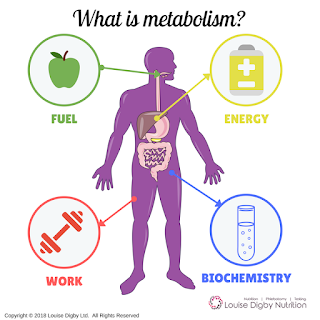HOW FAST & SLOW METABOLISM WORK
मेटाबोलिज्म क्या है ? कैसे काम करता है ? ये फ़ास्ट होना चाइये या स्लो होना चाइये ?
मेटाबोलिज्म हमारी बॉडी में एक इंजन की तरह काम करता है। जो हम खाना खाते है। हमारी शरीर में जो कैलोरीज जाती है। उनको हमारा मेटाबोलिज्म बर्न करने का काम करता है।
मेटाबोलिज्म फ़ास्ट है या स्लो है ये सबका अलग अलग होता है। अगर बात करे की मेटाबोलिज्म फ़ास्ट होना चाइये या स्लो होना चाइये तो इसका जवाब है फ़ास्ट। स्लो मेटाबोलिज्म अच्छा नहीं होता हमारे शरीर के लिए स्लो मेटाबोलिज्म से काफी परेशानिया होती है।
मीटबॉलिस्म स्लो होता है तो क्या होता है ?
अगर आपका मेटाबोलिज्म स्लो है तो इसका मतलब आप जो खाना खा रहे है जो कैलोरीज आपके शरीर में जा रही है वो आपका मेटाबोलिज्म बर्न नहीं कर रहा है। जिसकी वजह से आपका वेट बढ़ रहा है क्युकी आप जो खा रहे है वो कैलोरीज स्लो मेटाबोलिज्म की वजह से वो कैलोरीज फैट में बदल रही है जिसकी वजह से आपका वेट बढ़ रहा है।
अगर आप मेटाबोलिज्म स्लो है तो इसके लिए आप पहले अपने शरीर का BMR निकालना है उसके बाद आपका जो नंबर आता है। उसमे आपको 500 से 1000 कैलोरीज कम खानी है।
HOW TO CALCULATE BMR
Men: BMR = 88.362 + (13.397 x weight in kg) + (4.799 x height in cm) - (5.677 x age in years
Women: BMR = 447.593 + (9.247 x weight in kg) + (3.098 x height in cm) - (4.330 x age in years)
EXAMPLE : अगर आपके शरीर का BMR 2000 आता है तो आपको 500 से 1000 कैलोरीज कम लेनी है।
2000 - 500 = 1500
2000- 1000 = 1000
मीटबॉलिस्म स्लो होता है तो क्या होता है ?
अगर आपक पतले है आपका वेट नहीं बढ़ रहा है तो आपका मेटाबोलिज्म फ़ास्ट है। मतलब आप जो भी खा रहे है , उस खाने को आपका मेटाबोलिज्म बहुत जल्दी बर्न कर रहा है। जिसकी वजह से आपका वेट नहीं बढ़ रहा है। इसको ठीक करने के लिए आपको अपने शरीर का BMR निकालना है और जो भी नंबर आता है उसमे आपको 500 से 1000 कैलोरीज ज्यादा लेनी है।
EXAMPLE : अगर आपका BMR 2000 आता है तो आपको इसमें 500 से 1000 कैलोरीज ऐड करनी है।
2000 + 500 = 2500
2000 + 1000 = 3000
ये कोलोरिएस आपको खानी है। और वर्कआउट आपको कम करना है हफ्ते में 4 बार। ऐसा करने से आपका वजन आधे से एक किलो एक हफ्ते में बढ़ जाएगा।
--------------------------------------------------------------------------------------------------------------------------
ENGLISH TRANSLATION
What is metabolism? How does it work Should it be fast or should it be slow?
Metabolism acts like an engine in our body. What we eat the calories we consume in our body. Our metabolism works to burn them.
Metabolism is fast or slow, it will all vary. If we talk about whether metabolism should be fast or slow, then the answer is fast. Slow metabolism is not good for our body. Slow metabolism is very troublesome.
What happens when metabolism is slow?
If your metabolism is slow, then it means that the food that you are eating, which calories are going into your body, is not burning your metabolism because of which your weight is increasing because the calories you are eating are changing due to the slow metabolism of calories which is increasing
your weight.
If your metabolism is slow, for this you have to first calculate your body's BMR after that your number comes. You have to eat 500 to 1000 calories less.
HOW TO CALCULATE BMR
Men: BMR = 88.362 + (13.397 x weight in kg) + (4.799 x height in cm) - (5.677 x age in years
Women: BMR = 447.593 + (9.247 x weight in kg) + (3.098 x height in cm) - (4.330 x age in years)
EXAMPLE: If your body has BMR 2000, then you have to take 500 to 1000 calories less.
2000 - 500 = 1500
2000- 1000 = 1000
Therefore, some of your calories will be less than food and some calories will be less than when you EXCERCISE, which will burn your fat and your weight will reduce gradually.
What happens when metabolism is slow?
If you are thin, your weight is not increasing, then your metabolism is fast. Meaning, whatever you are eating, your metabolism is burning very quickly. Because of which your weight is not increasing.To correct this, you have to calculate your body's BMR and whatever number comes in it, you have to take 500 to 1000 calories more.
EXAMPLE: If your BMR 2000 comes, then you have to add 500 to 1000 calories to it.
2000 + 500 = 2500
2000 + 1000 = 3000
You have to eat these calories and you have to reduce the workouts 4 times a week. By doing this your weight will increase by half to one kg a week.





Comments
Post a Comment